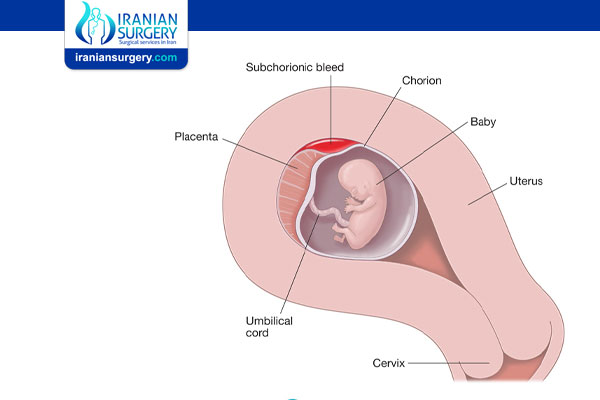Subchorionic Hematoma
Subchorionic Hematoma
What is a Subchorionic Hematoma?
A subchorionic hematoma (also called subchorionic hemorrhage or subchorionic bleeding) is when blood forms between the wall of your uterus and the chorionic membrane during pregnancy. The chorionic membrane is the outermost layer separating your baby’s amniotic sac from the wall of your uterus. It can be associated with vaginal bleeding during pregnancy. A subchorionic hematoma can shrink in size and resolve on its own without treatment. In some cases, your healthcare provider will recommend a plan for follow-up after assessing the hematoma. It rarely causes serious health complications.
Before Subchorionic Hematoma Treatment
How common is a subchorionic hematoma?
Subchorionic hematomas are most common in people who are between 10 to 20 weeks pregnant. It accounts for approximately 10% of all vaginal bleeding. Most hematomas are not a cause for concern because they are small or cause light bleeding.
Possible Causes
What are the symptoms of a subchorionic hematoma?
The most common symptom of a subchorionic hematoma is vaginal bleeding in the first half of pregnancy. The bleeding can range from heavy with clotting to light spotting. It can be accompanied by pelvic cramping, but this is usually not the case. Many people experience no bleeding at all, and the hematoma is discovered during a routine ultrasound. If you experience any bleeding during pregnancy, it’s always a good idea to talk to your healthcare provider so they can rule out any serious complications.
What causes a subchorionic hematoma?
A subchorionic hematoma occurs when the chorion membrane detaches from the wall of the uterus. The chorion membrane is the outermost layer of the amniotic sac. The amniotic sac, or the bag of waters, is where your baby develops in your uterus. This detachment from the uterine wall can be small or large. Healthcare providers are not entirely sure what causes this separation to occur. However, certain conditions may put you at a higher risk of developing a subchorionic hematoma.
Who is at a higher risk for a subchorionic hematoma?
Several factors have been associated with a subchorionic hematoma. Some of these include:
. Uterine irregularities.
. History of uterine infections.
. History of uterine trauma.
. History of miscarriages.
. IVF pregnancy.
. High blood pressure.
What are the complications of a subchorionic hematoma?
Subchorionic bleeding may increase your chances of pregnancy complications. Some of the possible complications are:
. Excess vaginal bleeding.
. Miscarriage.
. Preterm delivery.
. Placental abruption.
Most subchorionic hematomas resolve on their own without intervention and don't cause complications to the pregnancy. Your healthcare provider will evaluate your hematoma and determine if treatment is necessary based on several factors, including the size of the hematoma and how far along you are in pregnancy.
During Subchorionic Hematoma Treatment
Care and Treatment
How is subchorionic hematoma treated?
Many subchorionic hematomas will heal on their own over time — just as other cuts on your skin’s surface would. Your healthcare provider will evaluate your symptoms, review your health history and determine the location and size of the hematoma with ultrasound. A treatment plan is dependent on those factors, plus your baby’s gestational age.
Some possible treatments for subchorionic hematomas are:
. Reduction in activities like exercise and lifting heavy objects.
. Complete bed rest.
. Avoiding sex.
. Follow-up ultrasounds to assess the size of the hematoma.
. Monitoring of symptoms that suggest early labor like contractions and cramping.
. Hospitalization.
. Anti-D immune globulin (Rh0(D)) for people who are RhD negative.
Contact your healthcare provider immediately if you experience bleeding during pregnancy. Finding the cause of vaginal bleeding as early as possible is always better.
How long do subchorionic hematomas last?
There is no set amount of time for how long it takes a subchorionic hematoma to heal. In some cases, it will shrink in size on its own over a few weeks without causing any complications. Other times the hematoma can be large and problematic. Your healthcare provider may be able to predict if your subchorionic hematoma will resolve after an evaluation and ultrasound.
Does subchorionic hematoma harm my baby?
Most of the time a subchorionic hematoma does not harm your baby. If your hematoma is small, it may never cause problems or heal on its own as your pregnancy grows. In the case of large hematomas or hematomas that occur late in pregnancy, your healthcare provider may be more concerned about pregnancy complications.
It’s important to know that in most cases, a subchorionic hematoma will not affect your baby, and your baby will be born healthy.
Is having a subchorionic hematoma considered a high-risk pregnancy?
It depends on how severe the hematoma is and if you have other medical conditions. If your bleeding is excessive or the hematoma is large, you will likely be considered a high-risk pregnancy. However, if your hematoma is small or causing minor spotting, your healthcare provider may suggest a follow-up ultrasound in several weeks.
After Subchorionic Hematoma Treatment
When to Call the Doctor
When should I call my doctor if I have subchorionic hematoma?
If you have been diagnosed with a subchorionic hematoma, you should contact your healthcare provider if:
. There are changes in your symptoms.
. The amount of bleeding increases.
. You have contractions or cramping.
. You feel dizzy or lightheaded.
What are other causes of bleeding in pregnancy?
Bleeding during pregnancy is common and many conditions can cause bleeding while pregnant. Some of these are:
. Miscarriage.
. Ectopic pregnancy.
. Implantation bleeding.
. Bleeding after sex while pregnant.
. Infection.
. Placenta conditions like placenta previa or placental abruption.
If you're bleeding during pregnancy, contact your healthcare provider immediately. They may want to discuss your symptoms and examine you as soon as possible.
Can a subchorionic hematoma cause a miscarriage?
There’s a small risk of a miscarriage if you have a subchorionic hematoma. However, most of the time, subchorionic hematomas do not cause a miscarriage and your baby is born healthy.
Source:
. https://my.clevelandclinic.org/health/symptoms/23511-subchorionic-hematoma


